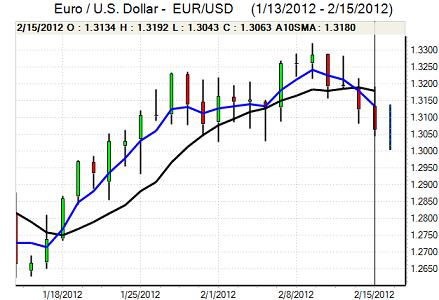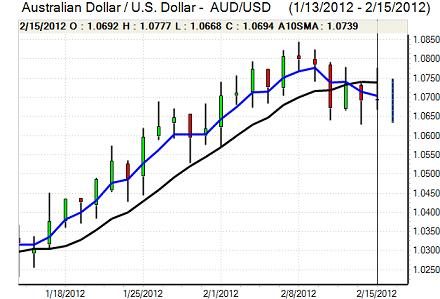EUR/USD
The Euro was again unable to push above the 1.32 area against the dollar on Wednesday and maintained a generally soft tone in choppy trading conditions.
There was a further stream of rumours and media reports surrounding Greece which helped to sustain market volatility. Finance Minister Venizelos took a generally downbeat tone in his comments during the day with references to the fact that many Euro-zone nations did not want Greece to stay in the Euro area.
There were reports of further delays to any agreement and there were particular concerns surrounding reports that Eurogroup members were looking to delay the loan package until after the elections scheduled for April, but also avoid a debt default despite the fact that there is a EUR14.5bn loan payment due in March. Eurogroup head Juncker stated that a deal was in reach by Monday, but there was little underlying confidence in the outcome as default speculation remained rife, especially given talk of a loan delay. There was also further concerns that the PSI agreement was in danger of falling apart.
The Euro-zone GDP data recorded a 0.3% decline in output for the fourth quarter despite a stronger than expected reading for France as Italian output fell sharply which maintained fears that peripheral economies would remain trapped in recession.
The US economic data was very mixed with a slightly firmer bias. There was a disappointment with the industrial data as production was unchanged for January. In contrast, the NAHB housing index rose to a 4-year high of 29 while there was also a much stronger reading for the New York PMI index which helped underpin dollar confidence to some extent.
As expected, the FOMC minutes recorded significant divisions and the net tone suggested that there was slightly less support for further quantitative easing than expected which provided support for the dollar. The Euro dipped to test support below 1.3050 as technical support was broken with lows close to 1.30.

Source: VantagePoint Intermarket Analysis Software
Call now and you will be provided with FREE recent forecasts
that are up to 86% accurate* 800-732-5407
If you would rather have the recent forecasts sent to you, please go here
Yen
The dollar was initially blocked close to 78.50 against the yen on Wednesday and dipped to lows near 78.20, but there was solid buying support on dips.
The dollar gained some net support from the US data releases, especially with solid improvement in the housing sector.
The yen will lose support if there is a sustained improvement in risk appetite, although underlying caution is still liable to prevail, especially given the high degree of uncertainty surrounding the Euro-zone outlook. The dollar consolidated just below 78.50 in Asia on Thursday.
Sterling
The UK unemployment claimant count rose by a larger than expected 6,900 for January while the unemployment rate was unchanged at 8.4% as youth jobless rates continued to rise.
The latest inflation report recorded a slightly increased forecast for 2012 with the bank expecting that the rate would be 1.8% in two years time which was close to the target level. Bank of England Governor King stated that there would be a volatile and uncertain period for the economy, but he was more optimistic that a fresh recession would be avoided. Nevertheless, he also stated that an increase in interest rates would trigger a recession and the bank remains committed to a policy of ultra-low interest rates. There was further evidence of improved sentiment as the Nationwide consumer confidence index rose to 47 for February from 38 previously.
There will be speculation that the Bank of England will sanction additional quantitative easing, although the latest survey evidence is liable to be critical for the bank’s stance. Sterling was blocked just above 1.57 against the dollar while advancing to near 0.83 against the Euro.
Swiss franc
The dollar found support in the 0.9150 area against the franc on Wednesday and rallied to a high in the 0.9250 area as the US currency gained additional traction. The Swiss currency continued to edge stronger against the Euro.
The ZEW business confidence index recorded an improvement to -21.2 for February from -50.1 the previous month which will help maintain confidence that the Swiss downturn is easing.
Safe-haven considerations will be important and the franc can still gain some support, especially if there is evidence of capital outflows from Japan.

Source: VantagePoint Intermarket Analysis Software
Call now and you will be provided with FREE recent forecasts
that are up to 86% accurate* 800-732-5407
If you would rather have the recent forecasts sent to you, please go here
Australian dollar
The Australian dollar pushed to a high in the 1.0780 area against the US dollar, but it was unable to sustain the advance and dipped later in the US session as the US currency secured a wider advance as risk appetite faded slightly.
The latest employment data was stronger than expected with employment increasing by 46,300 for January while unemployment fell to 5.1% from 5.3%. The currency was again able to secure only short-lived gains as underlying US gains curbed support and there was a fresh retreat to below 1.07.



